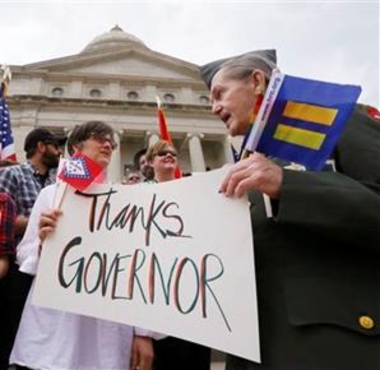Indiana unveils changes to religion bill; Arkansas in flux

Indianapolis (AP) — Indiana lawmakers on Thursday announced changes they plan to make to the state's new religious-objections law aimed at quelling widespread criticism from businesses and others who have called the proposal anti-gay.
The revisions, which still require approval from the full Legislature and Republican Gov. Mike Pence, come as lawmakers in Arkansas scramble to revise that state's own religious-objections legislation amid cries that it could permit discrimination.
The Indiana amendment prohibits service providers from using the law as a legal defense for refusing to provide services, goods, facilities or accommodations. It also bars discrimination based on race, color, religion, ancestry, age, national origin, disability, sex, sexual orientation, gender identity or U.S. military service.
The measure exempts churches and affiliated schools, along with nonprofit religious organizations.
House Speaker Brian Bosma said the agreement sends a "very strong statement" that the state will not tolerate discrimination.
The law "cannot be used to discriminate against anyone," he said.
Business leaders, many of whom had opposed the law or pledged to cancel travel to the state because of it, called the amendment a good first step. Indiana still does not include the LGBT community as a protected class in its civil-rights law, but Bosma said lawmakers met with representatives of the gay community and said they believed the new language addressed many of their concerns.
Former Indianapolis Mayor Bart Peterson, now a senior vice president at drugmaker Eli Lilly, praised the agreement but noted that work needs to be done to repair the damage done to the state's image.
"The healing needs to begin right now," he said.
In Arkansas, Gov. Asa Hutchinson has called on the Legislature to change the measure he had once said he would sign into law. House leaders hoped to give final approval Thursday to a bill to address his concerns.
The bill would prohibit state and local government from infringing upon someone's religious beliefs without a compelling reason. Hutchinson asked lawmakers to recall the bill, amend it or pass a follow-up measure that would make the proposal more closely mirror a federal religious-freedom law.
"How do we as a state communicate to the world that we are respectful of a diverse workplace and we want to be known as a state that does not discriminate but understands tolerance?" Hutchinson said to reporters at the Capitol Wednesday. "That is the challenge we face. Making this law like the federal law will aid us in that effort in communication, but also was my original objective from the beginning."
Hutchinson was the second governor in as many days to give ground to opponents of the law. Since signing Indiana's law last week, Pence and his fellow Republicans in the Legislature have been subjected to sharp criticism from around the country. It led Pence to seek changes to address concerns that the law would allow businesses to discriminate based on sexual orientation.
Hutchinson has faced pressure from the state's largest employers, including retail giant Wal-Mart. Businesses called the bill discriminatory and said it would hurt Arkansas' image. Hutchinson noted that his own son, Seth, had signed a petition urging him to veto the bill.
"This is a bill that in ordinary times would not be controversial," the governor said. "But these are not ordinary times."
Neither the Indiana nor Arkansas law specifically mentions gays and lesbians, but opponents have voiced concern that the language contained in them could offer a legal defense to businesses and other institutions that refuse to serve gays, such as caterers, florists or photographers with religious objections to same-sex marriage.
Supporters insist the law will only give religious objectors a chance to bring their case before a judge.
Similar proposals have been introduced this year in more than a dozen states, patterned after the federal Religious Freedom Restoration Act of 1993, with some differences. Indiana and 19 other states have similar laws on the books.
The proposal approved Wednesday night by the Arkansas Senate addresses only actions by the government, not by businesses or individuals. Supporters of the amended version said the change means businesses denying services to someone on religious grounds could not use the law as a defense.
Opponents of the law were encouraged by Hutchinson's comments.
"What's clear is the governor has been listening," said Chad Griffin, president of the Human Rights Campaign, the nation's largest lesbian, gay, bisexual and transgender rights group. Now opponents have to "keep the pressure on," he said.
Conservative groups that sought the measure questioned the need for any changes and said Hutchinson should sign the bill as is.
"I'm very puzzled at this point to see why the bill would need to be amended at this late date, considering everybody in the chamber has had a chance to see it," said Jerry Cox, head of the Arkansas Family Council. "I think it's been thoroughly vetted, and it's a good law."
Arkansas legislators face a short window to act. The governor has five days after the bill is formally delivered to him to take action before it becomes law without his signature, and lawmakers are aiming to wrap up this year's session Thursday.
By Tom Davies and Andrew DeMillo, Associated Press. Copyright 2015 The Associated Press. All rights reserved. This material may not be published, broadcast, rewritten or redistributed.
The Gayly – April 2, 2015 @ 9:35am.





